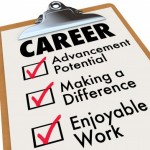
Widgetized Section
Go to Admin » Appearance » Widgets » and move Gabfire Widget: Social into that MastheadOverlay zone
Welcome To The World Of Work – Your First Job
How to succeed in your first full-time job
 College is over. Now it’s time to get down to the business of work. You may have participated in an internship program or two while you were in school. But your first full-time job is different than a three-month position as an intern.
College is over. Now it’s time to get down to the business of work. You may have participated in an internship program or two while you were in school. But your first full-time job is different than a three-month position as an intern.
Being successful in any new job isn’t easy. The first day can be downright scary. However, seasoned professionals have their past experience to draw on. When it’s your first full-time position it’s a lot different.
Obviously, you want to do well. You want to prove yourself to your new employer. And get along with your colleagues as well.
It’s a dilemma. But, help is here. With the goal of helping you navigate your first position, I contacted Emily Bennington, coauthor of Effective Immediately: How to Fit In, Stand Out, and Move Up at Your First Real Job and founder of Professional Studio 365 which provides onboarding services for new grads and their employers. She also is a contributing writer for Monster.com and a featured blogger for The Huffington Post.
Happily when I asked for an interview she graciously agreed to share her expertise.
CI: What should a grad do the week before starting their first job?
EB: Give some thought to what is going to be your ‘Silver Bullet’ at work. This is a great way to distinguish yourself early in your career because it’s your specialty area and a place where you can become a ‘go-to’ contact. A Silver Bullet could be anything from social media to proposal writing… as long as it falls within the parameters of your job, the list is endless. As a new hire, you will probably have to test out a few bullets before you land on a winner, which is why it’s good to start thinking about this early. Just remember to pick something that genuinely interests you, that is valued by the company, and that isn’t already being done by scores of others.
CI: The first day of work can be nerve racking, particularly when it’s your first job. What’s the most important thing to remember on the first day of work?
EB: On your first day, the mission is to make a positive first impression and that starts with looking the part. This doesn’t mean you have to be the most attractive person in your office, only that you must have the presence of a potential leader. It means crisp suits, conservative accessories, and an aura of confidence that comes from knowing you are a newbie to watch. Along that line, don’t be afraid to introduce yourself to your new colleagues. You don’t have to wait for them to come to you.
CI: Often one of the most difficult parts of starting a new job at any age is getting along with the existing staff. What are three ways to “fit in” at your new office?
EB: Don’t try to be ‘the superstar’ right out of the gate. This was a mistake I made as a new grad and I wound up alienating the very colleagues I needed to succeed. Now, I tell students to start their careers learning how to be a good follower. You have to know how to be part of a team before you can lead one.
Prepare for the ‘brain dump’. New hires need to come in to the workforce knowing they’re going to have a lot of information thrown their way at once. I call this the ‘brain dump’ and it happens to everyone. While the brain dump can be overwhelming at times, how you handle it speaks volumes to your new colleagues about what kind of team member you will be. I’ve seen new hires who are 100% positive and embrace the challenge and some who look like a deer in headlights.
Send a Friday Memo to your team each week. This isn’t fancy, it’s just a quick, bulleted email of accomplishments, areas where help or input is needed, and goals for the following week. Friday Updates only take a few minutes to create, but they show colleagues that you’re organized, eager to learn, and making real contributions to the success of your projects.
CI: The first few months on a new job are critical. What’s the best way to have a positive impact during the first three months?
EB: Mind your –ilities! Since you’re new to the workforce and completely unproven at this stage, your boss and colleagues can’t judge you on the quality of your work just yet. They WILL be judging you on –ilities though. These are things like punctuality (did you show up on time?), dependability (did you do what you said you were going to do?), likability (are you someone they can hang with?), humility (did you come through the door like the CEO from day one?), accountability (did you meet your deadline?), and so on. At this stage of your career, first impressions are absolutely critical so stack the odds in your favor by keeping your –ilities in check.
Emily Bennington is also a frequent speaker on the topic of career success and the founder of Professional Studio 365, which provides onboarding products, seminars, and consulting services to new grads and their employers. Emily has been featured on Fox Business, CNN, and ABC as well as quoted in publications including the Wall Street Journal, New York Post,US News and World Report, and Washington Post Express







You must be logged in to post a comment Login